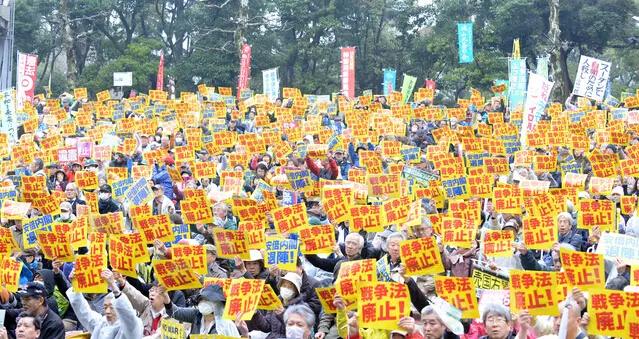The handing of Zhou Yongkang, once one of the most powerful officials in China, over to prosecutors marked the climax of this year's anti-corruption drive.
Zhou, one of nine Standing Committee members of the Political Bureau of the Communist Party of China (CPC) Central Committee from 2007 to 2012, is the latest and highest-ranking official taken down in the country's fierce anti-corruption campaign that began in November 2012.
"Nailing a high-ranking official like Zhou sends a strong message to all senior officials. It supports the Party's zero-tolerance policy against corruption," said Huang Weiting, a researcher with Seeking Truth, the official magazine of the CPC Central Committee, who has closely followed the anti-corruption issue.
However, China's anti-graft campaign has moved beyond setting warning examples to deter others. The scale of the investigations, as well as new initiatives and legal reform, indicate that the country intends to fight a protracted war.
The CPC leadership has realized that they face an unprecedented situation and serious challenges in leading a party of 86 million members and ruling a country of 1.3 billion people for the long term.
President Xi Jinping told media when he was elected general secretary of the CPC Central Committee in late 2012 that to address these problems, the CPC must "first of all conduct ourselves honorably."
At a CPC disciplinary watchdog meeting in early 2013, Xi also vowed to make no exceptions when it comes to Party discipline and law and to give no leniency, no matter who is involved.
TIGERS AND FLIES
Practice has been in line with the leader's words. Graft-busters have swept the military and civilian sectors, central and local governments, state-owned enterprises and public institutions.
According to the website of the CPC Central Commission for Discipline Inspection (CCDI), about 50 officials at the provincial and ministerial level or higher have been investigated for corruption or other serious disciplinary violations since November 2012.
Discipline inspectors have also tightened their grasp on low-ranking corrupt officials, who have been dubbed "flies."
In the first half of this year, 84,000 officials nationwide received disciplinary punishment, a year-on-year rise of 30 percent, while prosecutors filed graft cases against 35,600 people from January to September.
REGULAR INSPECTIONS AND A "FOX HUNT"
Some efforts might not be as sensational as sacking a heavyweight, but they have still made a profound impact.
Since 2013, the CPC central authorities have made dispatching anti-graft inspectors in teams to ministries, provincial governments, state-owned enterprises and public institutions a regular practice.
This year has seen three rounds of inspections, compared with two in 2013. The third round is under way at 13 state organizations, including the Ministry of Culture, China State Shipbuilding Corporation, China Unicom and Sinopec.
To engage the public, attempts have been made to reduce the mystery surrounding anti-graft work and increase online interaction.
The anti-graft campaign has also expanded overseas to cut off the escape route of corrupt officials.
Operation Fox Hunt, which will end on Dec. 31, has brought about 400 fugitives back to China, many of whom were corrupt officials, and 54 percent of them have turned themselves in.
Zheng Yongnian, a China studies expert with National University of Singapore, said that the anti-corruption drive is more than just netting "tigers and flies," but is also about giving reform opportunities to clean and honest officials.
In return, additional reforms will benefit the drive. A comprehensive legal reform plan, adopted at a key CPC session in October, included measures to push the Party, government, and officials to work in line with the law and build a more independent judicial system.
Local legislatures have attempted to improve anti-corruption legislation. The legislature of Guangdong Province in south China has consulted the public about a draft provincial regulation on corruption prevention.
The bill has drawn nationwide attention because it is the first one to ban "naked officials" -- officials whose spouses and children have all emigrated -- from leading positions and other "important and sensitive" posts. "Naked officials" are considered a high-risk group for corruption and fleeing investigation.
Experts noted that legal reform will help push the anti-corruption drive and improve efficiency and legitimacy.
 简体中文
简体中文

